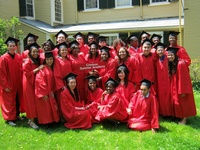“At school, classes were easy enough to go through. CSA was like something else. Quantitative reasoning really gave me trouble. I was like, maybe I’m not as smart as I thought,” Sealy says.
CSA students also meet three times a week before classes with mentors who are Harvard students or CSA graduates.
Mentors continue to help CSA students beyond the summer, including providing weekly homework help.
When applying to colleges, Sealy says he reached out to CSA graduates to ask about their college experiences.
In its early years, CSA benefitted from a grant from Goldman Sachs, which allowed CSA graduates to return to the program to take classes during the summer after their senior year of high school. Although that grant no longer exists, many CSA graduates, including Kaceli and Sealy, wish to return as mentors.
AN INNOVATIVE SUMMER
Instead of a history paper or a biology worksheet, an assignment at CHSA might be a family history narrative or a mock trial about genetics. This project-based learning is supported by teams of teachers, often three or four in one classroom—one veteran educator and several student teachers from Harvard’s Teacher Education Program.
As the official summer school of Cambridge, CHSA primarily serves students who failed classes in the previous school year. Others enroll in the same classes voluntarily to take extra courses for enrichment.
These innovative classes attract teachers across the nation. This summer, teachers will come to CHSA from Los Angeles, Denver, and Philadelphia.
Amanda Dillingham, a teacher at East Boston High School, says that the program is well known in Boston. She will teach at CHSA for a third summer this year.
“I’m tired of being asked, ‘Why do I care? Why do I need to learn this?’ [and being told,] ‘I don’t care. I don’t care,’” Dillingham says. That frustration led her to come up with the mock trial method to teach her summer school students about genetics.
CHSA is directly connected to Cambridge’s public high school as well as its two charter high schools and one Boston school, Cristo Rey, but any student in Cambridge, including those who attend private schools during the year, can apply.
While originally the program was geared toward cramming remedial course content into students’ heads, former co-directors Kyle J. Hartung and Drew M. Echelson decided to revamp the curriculum in 2010 to focus on project-based education. The new approach has received much praise from the school community.
“I want to credit the folks at the academy for taking that feedback and improving it so the students are doing less of the drill and kill and more of the project-based learning,” says Cambridge Superintendent of Schools Jeffrey Young.
Brendan Kells, a teacher at Cambridge Rindge and Latin School who serves as co-principal of CHSA, says that the new method does not attempt the nearly impossible task of teaching a summer school course as if it were a regular class.
Read more in News
New Book by HBS Professor Advocates for Downtime













